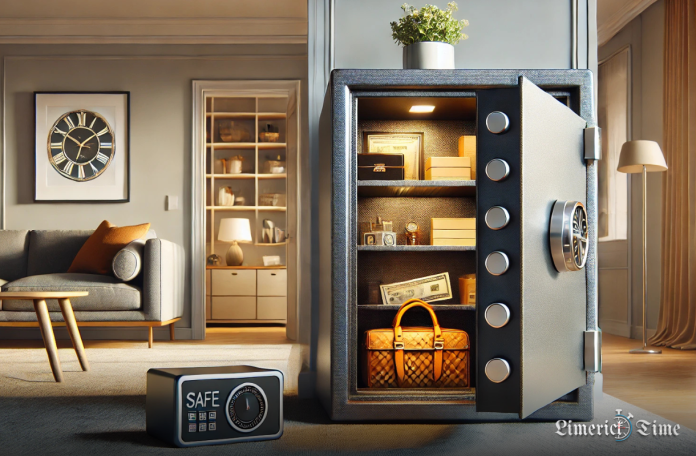In today’s world securing your items has become one of the most important aspects an individual would want to achieve. A home safe is a relatively basic and efficient means of protecting valuable papers, money, jewelry, and other personal belongings. However, with the many varieties of safes obtainable in today’s market placing an order for your safe is not an easy thing. This should give you an idea of what to look for, the variations in the types of safes, plus additional assistance to ensure you make the right decision.
Why You Need a Home Safe
Home safes are essential for several reasons:
- Protection from Theft: A secure home safe keeps your valuables out of reach during a burglary.
- Fire and Water Resistance: Many safes offer protection against fire and flooding, ensuring critical documents and possessions survive unexpected disasters.
- Convenience: With a home safe, you don’t need to rely on banks or storage facilities to store essential items.
- Peace of Mind: Knowing your items are safe allows you to focus on daily life without constant worry.
Types of Home Safes
When selecting a safe for your home, it’s essential to understand the various types available and their purposes.
1. Fireproof Safes
Designed to protect documents and valuables from fire damage, these safes can withstand high temperatures for extended periods. Fireproof safes are ideal for storing:
- Passports and identification documents
- Birth certificates
- Insurance policies
- Photos
2. Waterproof Safes
Flood resistant safes safeguard items from water in cases of flood, leakage, or calamities such as floods. Often it is linked with fire protection possibilities.
3. Burglary Safes
Built to resist forced entry, burglary safes are made of durable materials and often include advanced locking mechanisms such as biometric scanners or digital keypads.
4. Wall Safes
These safes are installed directly into walls, hidden behind paintings or modern furniture. Wall safes offer discreet storage and are harder to locate during a break-in.
5. Floor Safes
Installed on the floor and concealed with carpeting or furniture, floor safes provide excellent security and are difficult to access without knowledge of their location.
6. Portable Safes
Ideal for those on the go, portable safes are lightweight and easy to transport. These are perfect for temporary storage or travel.
Key Features to Consider
Choosing the right home safe involves evaluating the following features:
1. Locking Mechanism
- Key Locks: Simple and reliable but require secure key storage.
- Combination Locks: Require a code for access, offering solid protection.
- Digital Keypads: Easy to use and often programmable.
- Biometric Scanners: Use fingerprints for access, providing top-tier security.
2. Size and Capacity
Consider the size of items you intend to store and future needs. A safe that’s too small may require an upgrade sooner than expected.
3. Fire and Water Ratings
Check the safe’s UL (Underwriters Laboratories) or ETL ratings for fire and water resistance. A good fireproof safe can withstand temperatures of up to 1,500°F for an hour.
4. Durability and Material
Safes made of heavy steel with reinforced doors provide excellent protection against physical attacks.
5. Anchoring Options
Bolting a safe to the floor or wall enhances security by preventing thieves from removing it.
6. Accessibility
Make sure the safe is easily accessible but it cannot be seen by any visitor to the building comfortably.
What Can You Store in a Home Safe?
Home safes are versatile and can store a wide range of items, including:
- Cash and coins
- Jewelry
- Legal documents such as wills, deeds, and contracts
- Electronics like external hard drives or USBs
- Family heirlooms
- Firearms (in safes designed for gun storage)
How to Properly Use a Home Safe
Even the best safe can fail if not used correctly. Follow these tips to maximize security:
- Choose a Strategic Location: Install the safe in a concealed area such as a closet, behind furniture, or within a false wall.
- Anchor It Securely: Prevent thieves from removing the safe by bolting it to the floor or wall.
- Keep the Code Private: Avoid sharing the combination or password unnecessarily.
- Maintain Accessibility: Ensure you can access the safe quickly in emergencies.
Top Brands for Home Safes
Some reputable brands known for their high-quality safes include:
- SentrySafe: Renowned for fireproof and waterproof safes.
- Honeywell: Offers a wide range of security products.
- Barska: Known for biometric safes.
- First Alert: Specializes in fire and theft protection.
- Amazon Basics: Provides budget-friendly options.
Common Mistakes to Avoid
- Underestimating Size: Always choose a slightly larger safe than you think you need.
- Ignoring Installation: Improperly installed safes are easier to steal.
- Choosing Based on Price Alone: Focus on features and ratings rather than opting for the cheapest option.
- Neglecting Maintenance: Regularly check locks, batteries, and seals to ensure optimal performance.
Conclusion
Purchasing a home safe is the best decision that any homeowner can make with the aim of getting that security for his or her property. Accurate information on the various types of safes, the facility to assess vital factors, and the proper application of the various spare parts will help in the proper safety of your belongings. Therefore, one needs to spend some time evaluating individual needs and decide on what trade-off size/ security/convenience a safe should provide.
Secure your home, secure your future—because peace of mind is priceless.


